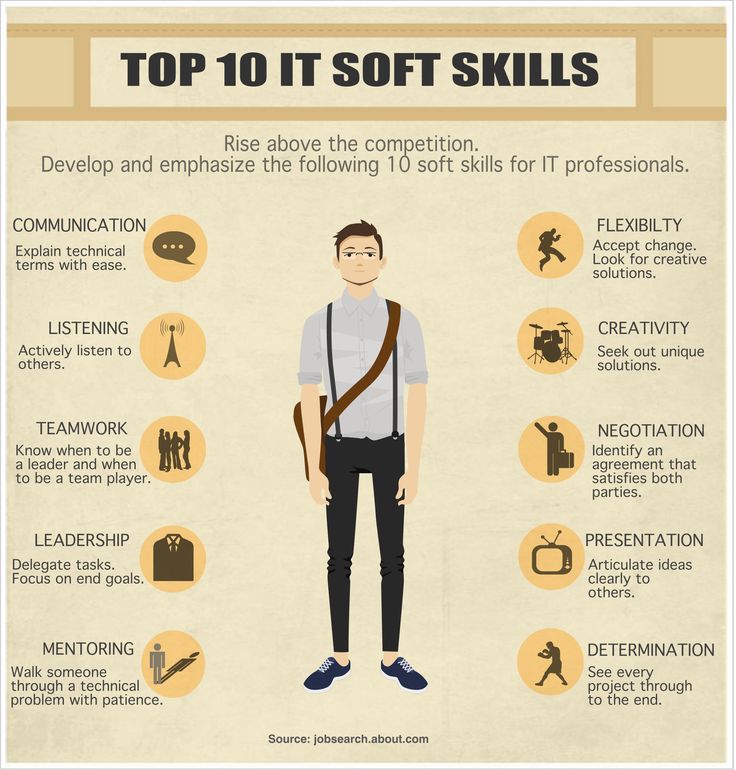10 Skills That Can Help You Find Help for an IT Job
Published

You may think you're not cut out for IT because you lack the technical skills, but as it turns out, you may already have the secret sauce to become an IT rockstar. The most important ingredients for success in the IT sector are enthusiasm and a willingness to learn. You can acquire the technical skills you need, but without the right ones Soft Skills you will not make it to the top in the IT industry.
Soft skills are qualities that are inherent to one's personality. They are often difficult or impossible to learn. They are crucial for success in interpersonal relationships and often also for success at work. You may be wondering which jobs require the skills you naturally bring. And if you want to know which jobs require communication, problem-solving skills, and analytical skills, read on. We'll explain why IT jobs might be right for you. But before we jump into this area, there are a few things you should know about the technical skills needed in IT.
First, the technical skills

Those : vinsys.com
So what “hard” skills do you need for an IT career? The technical skills vary from job to job. In many cases, it is a myth that you have to be good at math or science to get into the IT industry. Some of the most important qualities that will get you started in the technology field are the desire to learn and develop and the enthusiasm to try new things.
In most cases, technical skills can be acquired over time and through training, certifications, and practical experience. And you don't necessarily have to gain this practical experience in a paid job. You can earn them in many ways, from tinkering on your home computer to volunteer work to part-time jobs.
Technical skills are often easier to learn than some of the soft skills needed in IT. They are often innate in people who are particularly well suited to a career in information technology. Of course, if you don't have all of the soft skills listed below, that shouldn't stop you from looking for jobs in tech. IT jobs come in many shapes and sizes, and some require more soft skills than others.
In addition to the technical skills, it is primarily the soft skills that make you an IT rock star.
Communication
As an IT professional, you must be able to communicate well with your managers and colleagues to help them solve technical problems and better utilize the power of their technology tools. If you are a developer or in the field IT security work, you must work well in teams and be able to communicate your ideas well with your colleagues. Almost every IT-Job requires good communication skills, both verbal and written - email communication is likely to be a large part of your work. Technology is not a lonely field, even though it is often portrayed that way. If you enjoy teaching people about technology and explaining technical topics in a way that everyone can understand, a career in IT could be right for you. CIO Magazine, for example, recognizes the need for strong communication skills in the IT industry. In a recent magazine article, James Stanger of CompTIA explained that soft skills are one of the seven most important career trends of the future.
Organisation
Those who are organized work more efficiently and productively. Many IT careers are dynamic and give you the opportunity to focus on different projects and tasks. Multitasking can be an important skill - but only if you can organize yourself well. The ability to keep track of things like your schedule and daily tasks is important, as is the ability to efficiently divide and prioritize your daily tasks. If you find organization and time management easy, your role in the technology sector might also be interesting for you.
Analytical skills
Analytical skills are a huge advantage in the IT industry, where you are expected to often find logical solutions to problems. Analytical skills allow you to diagnose and resolve technical problems. So you can e.g. For example, you can find out why a line of code doesn't produce the desired result or why a server doesn't work. If you have an analytical mind, you may even spot problems before they arise, or feel compelled to take things apart to get a better idea of how they work. If this is the case, you are probably an aspiring IT professional. Examples of analytical skills include the ability to create - and read - pivot tables in a spreadsheet, identify trends over time, and identify key performance indicators. It is also important to learn how to identify critical events and eliminate outliers from datasets.
creativity

Those : indeed.com
Creativity may not be necessary for all IT jobs, but it is a useful talent for many of them. If tech moguls like Mark Zuckerberg and Steve Jobs weren't creative, they would never have developed their groundbreaking products and revolutionary ideas. Even if you don't aspire to be the next Bill Gates, your tech job will likely require you to come up with ideas for improving processes or products, or help your colleagues find innovative solutions to their tech problems. In fact, one of the most important requirements in today's IT jobs is the ability to creatively use technology to meet a specific business need or create a solution that advances the company.
Project management
As an IT professional, you will likely be juggling multiple projects and responsibilities, and it is critical that you are able to meet deadlines and achieve benchmarks. Good project management includes the ability to create professional plans, set and achieve goals, and collaborate with colleagues to solve project problems. With a natural talent for project management, you are ideally suited for many technical careers. Refined Project management skills also give you an advantage if you aspire to a leadership position. If you are able to make projects successful with the help of your colleagues, you will be recognized by your superiors and can be recommended for promotion to more responsible positions.
persistence
If you don't give up easily when faced with difficult tasks, you can go far in a technical career. The best IT professionals are willing to persist in tinkering with a particular technology to find solutions to challenges, even when everyone else has given up. Technology jobs also require a willingness to learn and develop, as practices and technological tools are constantly changing. You must be able to persevere when new information and new challenges come your way. When the going gets tough, the best IT professionals stick with it and reap the rewards.
Troubleshooting
Do you like solving puzzles? As mentioned earlier, IT jobs are some of the best jobs when it comes to solving problems. Have you ever spent hours trying to figure out why your computer, printer, or phone isn't doing what you want and had fun? A career in information technology could be right for you. Many of the technical skills you need for the various careers in the IT industry can be acquired through trial and error, so problem-solving skills are necessary for your entry into the career field.
ingenuity
IT resourcefulness also means that you are able to find technologies, software and products that increase your own productivity and the productivity of others. IT professionals who know how to make good use of available resources tend to be successful in their jobs. And IT professionals who are constantly looking for new resources are often at an advantage. Ingenuity is particularly beneficial for those who don't have much technical experience - such as: B. career changers. You don't always have to have an answer - you just have to know how to find it.
curiosity

Those : pinterest.com
Enjoyment of learning new things and a genuine interest in how things work are important assets for IT employees. In general, curiosity about the inner workings of devices will get you far in IT. For example, the best security professionals have an innate sense of curiosity about how things work under the hood, e.g. B. how to break into systems. Without this sense of curiosity, they likely wouldn't be as creative in applying security controls to company processes.
Interested in helping others
Although IT is not traditionally viewed as a "helping" field like medicine or social work, a large portion of almost all jobs are in IT Technology industry in helping people, be it developing new technologies that make people's lives easier or helping them overcome technical hurdles. Information technology jobs are among the best careers for people who enjoy helping others. The ability to work in a team is critical, as seen in this article, which asked CompTIA about the importance of teamwork as perhaps the most important soft skill.








